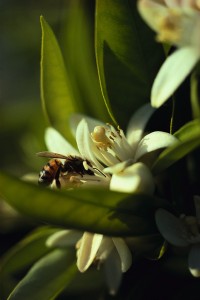 When it comes to preventative health and wellness, Bee Propolis is one of the most effective and supportive natural remedies available to us today.
When it comes to preventative health and wellness, Bee Propolis is one of the most effective and supportive natural remedies available to us today.
Propolis is considered an herb because it changes little from its material state. Propolis is comprised of resins which bees collect from tree buds and bark. When tested, the propolis is almost identical to the original resins seeping from the trees, thus classifying it as an herb. Bees use it to fortify the hive; not only using it to seal up minute holes, but also using it to prevent disease, parasites and bacteria from entering the hive.
Bee Propolis has been used since ancient times as both a topical and internal healing agent. There is record of it being used by the Egyptians, the Greeks and the Romans, by the Incas in the 11th century and by the French in the 18th and 19th centuries.
Topically it can be used to heal burns, cuts, wounds and warts. It is an effective anti-fungal and anti-microbial agent and has been effective in eliminating MRSA (antibiotic resistant bacteria). Most of the information about the effectiveness of Bee Propolis is anecdotal amassed over thousands of years of use. Today though there are a handful of laboratory and clinical studies that have examined both the anti-microbial and anti-fungal potential of Propolis.
In 2004 a study was published by an Israeli research group in the Archives of Pediatric and Adolescent Medicine. The group studied ‘the effectiveness of a syrup containing Echinacea, Propolis and Vitamin C in preventing respiratory tract infections in children.’[i] The study included 430 children ages one to five years old with one group receiving the herbal remedy and the other receiving a placebo.
Of the children who took the herbal remedy, there were 55% less instances of respiratory tract infections and if these children did get sick, it was for a shorter period of time.
Additional studies have been done in the Netherlands, Romania and Poland all showing that Propolis acts as a preventative for respiratory tract infections and greatly reduces the recovery time in contracted cases, when used in combination with antibiotics.
Caution: Both adults and kids can take Bee Propolis, but if you have bee allergies then you may be severely allergic to Bee Propolis; additionally if you are uncertain, the same concerns are valid. If you don’t know if you have a bee allergy, you can avoid Propolis altogether, or you can do a test by taking a small amount and observing your reaction. Logic would tell us, do it when others are around so you can get help if you need it. As always, if you are uncertain about any type of remedy, consult your doctor before using it.
Topically you can mix Propolis with raw honey to place on open wounds.
Internally, the recommend dosage is 500 mg daily for prevention. I advise taking it two weeks on and two weeks off or five days on and two days off particularly during high cold and flu season. By taking a break it lets your body’s own immune system reset and strengthen, rather than being consistently fortified. If you feel yourself coming down with something, take 1000 mg for a few days and see if you can ward whatever it is off.
I’ve been taking Bee Propolis since the early Fall and have noticed a marked difference in my immunity this year.
If you are interested in learning more about Bee Propolis and the many benefits of all bee products, I recommend you read ‘Basic Health Publications User’s Guide to Propolis, Royal Jelly, Honey and Bee Pollen: Learn How to use “Bee Food” to Enhance Your Health and Immunity’ by C. Leigh Broadhurst, Ph.D. The author offers a comprehensive overview of all Bee Products. A few others include: BEE WELL BEE WISE with Bee Pollen, Bee Propolis, Royal Jelly (Dr Jensen’s Health Handbook #5) and Bee Propolis: Natural Healing from the Hive (Nature’s Remedies S.) by James Fearnley
(C) Christine Agro 2013
Christine Agro is a Mom, Clairvoyant, Metaphysical Expert and Traditional Naturopath/Master Herbalist. Christine has a new book coming out in February, ’10 Ways to Naturally Avoid Colds and Flu (…and What To Do When They Come Knocking) Second Edition. Visit Christine’s website and subscribe to her blog and you’ll be alerted when the book is available. Please find more information at www.christineagro.com
1. C. Leigh Broadhurst, Ph.D., Jack Challem Editor, Basic Health Publications User’s Guide to Propolis, Royal Jelly, Honey and Bee Pollen: Learn How to use “Bee Food” to Enhance Your Health and Immunity. Basic Health Publications, Inc., 2005, Kindle Version, Loc 303.

